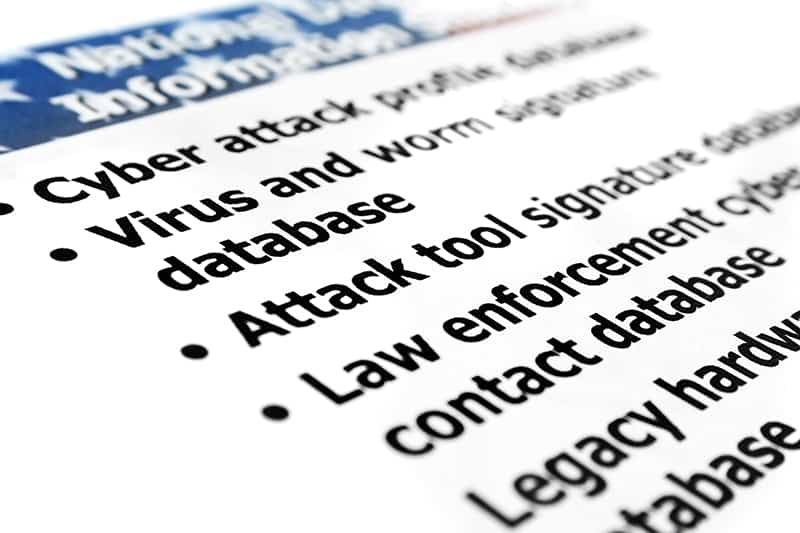Click here to get this post in PDF

Waiting until you see evidence of your business potentially being hacked is no longer an option.
In the modern world, businesses face the critical threat of cyber-attack, which can effectively cause an organisation to completely shut down.
It’s an unavoidable part of our current climate – however, there are ways businesses can adapt to these new challenges.
Here are some simple guidelines to follow to ensure your cyber security is up to par and your business is as best protected as it can be:
Keep Yourself on Your Toes
The first step is in keeping yourself well informed.
Understanding the general threats, what threatens your business specifically, and where your security currently stands is crucial.
General Threats
The world of cybercrime isn’t static – it’s continuously evolving, spawning brand new hacks alongside new variants on older scams. Educating yourself about what’s out there will help keep you aware of what you’re dealing with.
Specific Threats
The nature of your business may affect what kind of attacks you’re prone to. For example, if you are in Colorado and looking for IT Security in Denver, you can search online for companies offering a cyber security audit that will help you determine if there are any specific threats you need to implement particular security measures against.
Your Current Security
A cyber security audit will also determine where your security measures currently stand. This can be a well-needed eye-opener for many businesses. The audit could expose weaknesses in your security, and guide you towards key areas in need of addressing.
Having a well-rounded understanding of each of these points will put you on a good footing for protecting your organisation.
Prioritise Security in the Workplace
Do NOT underrate cyber security; as mentioned before, it’s a significantly important issue for modern businesses.
The best way to fully prioritise security in the workplace is by creating a security-conscious culture. Software updates should become the norm, with everyone holding a comprehensive understanding of cyber security.
While external threats are prominent and very well known, your employees play a huge part in your security. Some employees may make misguided choices or sloppy mistakes, while some may actively abuse their privileges without care for compromising your business.
Informing everyone in the workplace, and everyone your business deals with, of your risk management policies and your new security measures, will create a security-conscious culture. Ideally, within this culture, everyone understands and complies with the policies and is less prone to sloppy mistakes or abusing their power.
It’s your responsibility to make sure everyone is up to speed and compliant.
Determine Your Cyber Security Role
Business and government cyber security roles may come with different tasks. But they intertwine and co-exist together. There’s no doubt that the government understands that cybercrime is a major concern among enterprises. Cyber hacking, data breaches, and identity theft can reduce business profits. These cyber security issues can also impede the amount companies can contribute to employment rates and government taxes.
For this reason, business owners also play a crucial role in maintaining enterprise cyber security as much as government cyber security experts do. As a business owner, your reputation and company are at stake when customer data is compromised. Therefore, you have to invest in more stringent cyber security measures to assure your customers and protect your business. Your cyber security role is to ensure that you have suitable security measures to reduce cyber threats and vulnerabilities.
As mentioned, software updates can help improve your cyber security. Aside from that, installing a robust firewall network security is a good idea to monitor traffic, prevent hacking, promote privacy, and stop spyware and attacks. Moreover, cloud computing provides your business with greater quality control, data security, scalability, efficiency, mobility, and competitive advantage. You no longer need to rely on storing and processing digital data on easy-to-breach external and internal computer hard drives.
Don’t Assume it Won’t Happen to You
Assuming the worst is the best option in this situation.
Create some worst-case scenarios for your business being hacked, factoring in every possible thing that could go wrong as a result. The reason this is crucial is that it allows you to effectively over-prepare for any attack.
No business is immune, so by having every response and recovery period mapped out in advance, you put yourself in a better position to combat a variety of threats.
You can never be sure of when an attack will occur, how impactful it will be, and how much recovery time you may need as a result. Customer data could be breached, and important systems may need to be backed up and built up all over again.
This period of downtime can put your organisation at a serious disadvantage.
Being proactive as opposed to passive will reduce both the initial threat of an attack, as well as the impact of an actual attack.
Innovate UK provides a variety of interesting programs and information. If you’re interested in learning more about these, you can find more information on their YouTube channel here.
You may also like: A Look into Cyber Security

Keep your data secure and protect your business by applying security techniques. Become an expert in Cyber Security by complete your training from pricoris India.